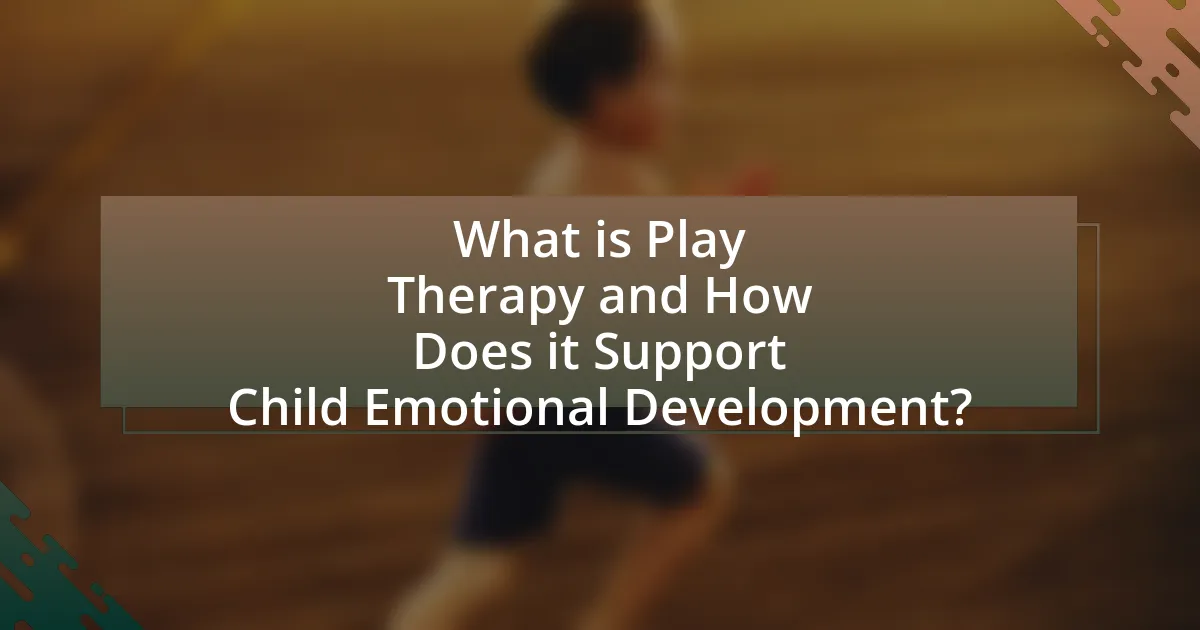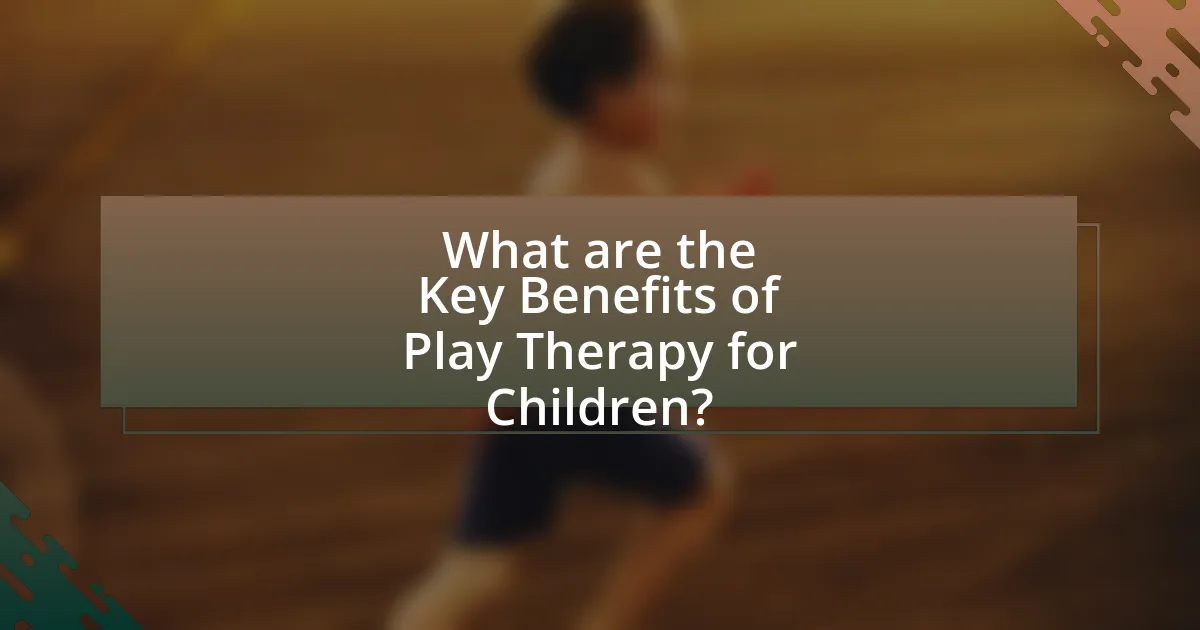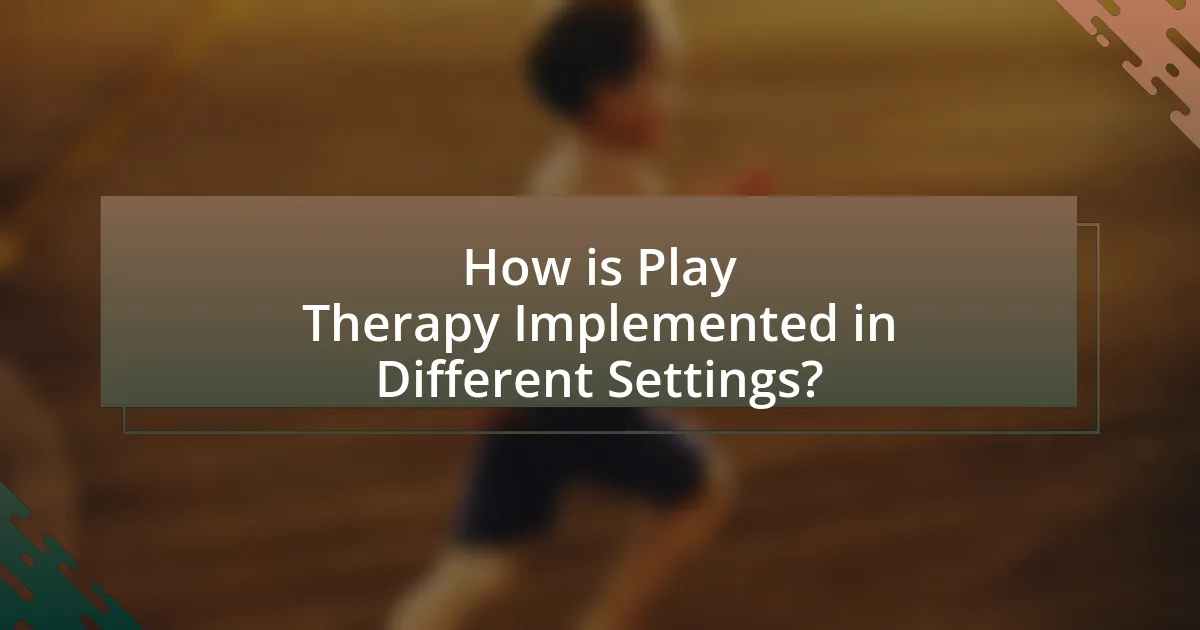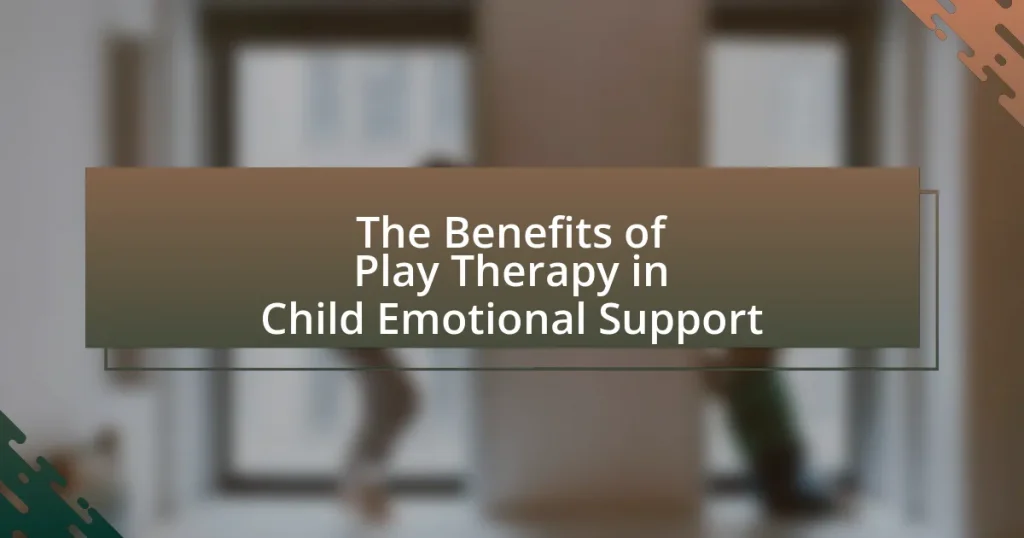Play therapy is a therapeutic approach that utilizes play as a medium for children to express their emotions, thoughts, and experiences, significantly supporting their emotional development. This article outlines the fundamental principles of play therapy, its differences from traditional therapy methods, and the vital role of emotional support in children’s lives. It discusses common emotional challenges faced by children, the benefits of play therapy in enhancing emotional regulation and social skills, and the various settings in which play therapy is implemented. Additionally, the article highlights the qualifications of play therapists, the importance of a conducive environment for therapy, and practical tips for parents considering this intervention for their child.

What is Play Therapy and How Does it Support Child Emotional Development?
Play therapy is a therapeutic approach that uses play as a means for children to express their emotions, thoughts, and experiences. This method supports child emotional development by providing a safe environment where children can explore their feelings and resolve conflicts through play. Research indicates that play therapy can enhance emotional regulation, improve social skills, and foster resilience in children. For instance, a study published in the International Journal of Play Therapy found that children who participated in play therapy showed significant improvements in emotional expression and behavioral issues, demonstrating its effectiveness in promoting emotional well-being.
What are the fundamental principles of Play Therapy?
The fundamental principles of Play Therapy include the belief that play is a natural medium for children to express their feelings and experiences. This therapeutic approach is based on the understanding that children communicate and process emotions through play, which allows them to explore their thoughts and feelings in a safe environment. Additionally, Play Therapy emphasizes the importance of the therapeutic relationship between the child and the therapist, fostering trust and safety, which are crucial for effective emotional support. Research indicates that Play Therapy can lead to significant improvements in emotional regulation and social skills among children, validating its effectiveness as a therapeutic intervention.
How does Play Therapy differ from traditional therapy methods?
Play Therapy differs from traditional therapy methods primarily in its use of play as a medium for communication and expression. While traditional therapy often relies on verbal communication and structured dialogue, Play Therapy allows children to express their feelings and experiences through play, which is a natural form of expression for them. Research indicates that play can facilitate emotional healing and understanding, as it enables children to process complex emotions and experiences in a safe environment. For instance, a study published in the Journal of Child Psychology and Psychiatry found that Play Therapy significantly improved emotional and behavioral outcomes in children compared to traditional talk therapies.
What role does play have in a child’s emotional expression?
Play serves as a vital medium for a child’s emotional expression, allowing them to communicate feelings and experiences that they may not yet have the verbal skills to articulate. Through play, children can explore complex emotions such as joy, fear, and sadness in a safe environment, facilitating emotional processing and understanding. Research indicates that play therapy significantly enhances emotional regulation and expression in children, as evidenced by a study published in the Journal of the American Academy of Child & Adolescent Psychiatry, which found that children engaged in play therapy showed improved emotional expression and coping skills compared to those who did not participate in such interventions.
Why is emotional support crucial for children?
Emotional support is crucial for children because it fosters their emotional development and resilience. Children who receive consistent emotional support are better equipped to manage stress, build healthy relationships, and develop a positive self-image. Research indicates that emotional support from caregivers significantly influences a child’s ability to cope with challenges; for instance, a study published in the Journal of Child Psychology and Psychiatry found that children with strong emotional support systems exhibit lower levels of anxiety and depression. This underscores the importance of emotional support in promoting mental health and overall well-being in children.
What are the common emotional challenges faced by children?
Children commonly face emotional challenges such as anxiety, depression, and behavioral issues. Anxiety can manifest as excessive worry or fear, often triggered by social situations or academic pressures. Depression in children may present as persistent sadness, loss of interest in activities, or changes in appetite and sleep patterns. Behavioral issues, including aggression or defiance, can arise from difficulties in expressing emotions or coping with stress. Research indicates that approximately 1 in 6 children aged 2 to 8 years experience a mental health disorder, highlighting the prevalence of these emotional challenges.
How can emotional support impact a child’s overall development?
Emotional support significantly enhances a child’s overall development by fostering secure attachments and promoting emotional regulation. When children receive consistent emotional support, they develop a strong sense of trust and safety, which is crucial for their social and cognitive growth. Research indicates that children with strong emotional support systems exhibit better academic performance, improved social skills, and lower levels of anxiety and depression. For instance, a study published in the Journal of Child Psychology and Psychiatry found that children who received emotional support from caregivers showed higher resilience and adaptability in challenging situations. This evidence underscores the critical role emotional support plays in shaping a child’s developmental trajectory.

What are the Key Benefits of Play Therapy for Children?
Play therapy provides several key benefits for children, including enhanced emotional expression, improved social skills, and increased problem-solving abilities. Through play, children can express feelings and experiences that they may not be able to articulate verbally, facilitating emotional healing and understanding. Research indicates that play therapy can significantly reduce symptoms of anxiety and depression in children, as evidenced by a meta-analysis published in the Journal of Clinical Psychology, which found that play therapy is effective in improving emotional and behavioral outcomes. Additionally, play therapy fosters social skills by allowing children to interact with peers and therapists in a safe environment, promoting cooperation and communication. Overall, play therapy serves as a vital tool in supporting children’s emotional development and well-being.
How does Play Therapy enhance emotional regulation in children?
Play Therapy enhances emotional regulation in children by providing a safe space for them to express and process their emotions through play. This therapeutic approach allows children to engage in imaginative scenarios that reflect their feelings, helping them to understand and manage their emotional responses. Research indicates that Play Therapy can lead to significant improvements in emotional regulation, as children learn to identify their emotions and develop coping strategies in a non-threatening environment. For instance, a study published in the Journal of Child Psychology and Psychiatry found that children who participated in Play Therapy exhibited better emotional control and reduced anxiety levels compared to those who did not receive such intervention.
What techniques are used in Play Therapy to promote emotional regulation?
Play Therapy employs several techniques to promote emotional regulation, including expressive play, role-playing, and art activities. Expressive play allows children to communicate feelings and experiences through toys and games, facilitating emotional expression and understanding. Role-playing enables children to explore different scenarios and emotions in a safe environment, helping them to process and regulate their feelings. Art activities provide a creative outlet for children to express emotions visually, which can enhance their ability to articulate feelings verbally. Research indicates that these techniques effectively support emotional regulation by allowing children to externalize and manage their emotions in a therapeutic context.
How do children respond to these techniques during therapy sessions?
Children typically respond positively to play therapy techniques during therapy sessions, demonstrating increased engagement and emotional expression. Research indicates that play therapy allows children to communicate feelings and experiences through play, which can lead to improved emotional regulation and social skills. For instance, a study published in the International Journal of Play Therapy found that children who participated in play therapy showed significant reductions in anxiety and behavioral issues, highlighting the effectiveness of these techniques in fostering emotional support.
What social skills can children develop through Play Therapy?
Children can develop essential social skills through Play Therapy, including communication, cooperation, empathy, and conflict resolution. During Play Therapy sessions, children engage in play activities that encourage them to express their feelings and thoughts, which enhances their ability to communicate effectively with peers. Additionally, cooperative play scenarios foster teamwork and collaboration, teaching children how to work together towards common goals. Empathy is cultivated as children learn to understand and share the feelings of others during role-playing and storytelling activities. Furthermore, Play Therapy provides a safe environment for children to navigate conflicts, allowing them to practice problem-solving strategies and develop resilience in social interactions. Research indicates that these skills are crucial for healthy social development and can lead to improved relationships and emotional well-being in children.
How does Play Therapy facilitate peer interaction and relationship building?
Play Therapy facilitates peer interaction and relationship building by creating a safe and structured environment where children can express themselves through play. This therapeutic approach encourages children to engage in cooperative play, which fosters social skills such as sharing, communication, and empathy. Research indicates that through role-playing and imaginative scenarios, children learn to navigate social dynamics and develop friendships. For instance, a study published in the “International Journal of Play Therapy” by Bratton et al. (2005) found that children who participated in Play Therapy showed significant improvements in their ability to interact with peers and form positive relationships.
What specific social skills are commonly improved through Play Therapy?
Play Therapy commonly improves social skills such as communication, cooperation, empathy, and conflict resolution. Through interactive play, children learn to express their feelings verbally and non-verbally, enhancing their ability to communicate effectively with peers. Additionally, Play Therapy encourages cooperation as children engage in group activities, fostering teamwork and shared problem-solving. Empathy is developed as children role-play different scenarios, allowing them to understand and relate to others’ emotions. Conflict resolution skills are also honed as children navigate disagreements during play, learning to negotiate and find mutually acceptable solutions. Research indicates that these improvements in social skills can lead to better peer relationships and overall emotional well-being in children.

How is Play Therapy Implemented in Different Settings?
Play therapy is implemented in various settings, including schools, hospitals, and private practices, each tailored to meet the specific needs of children in those environments. In schools, play therapy is often integrated into counseling services to help children cope with academic stress and social challenges, utilizing toys and games to facilitate communication and emotional expression. In hospitals, play therapy serves as a therapeutic tool to help children process medical experiences and reduce anxiety, often conducted in playrooms designed to create a safe and engaging atmosphere. Private practices typically offer a more individualized approach, where therapists create a dedicated play space to foster a trusting relationship, allowing children to explore their feelings through structured play activities. These implementations are supported by research indicating that play therapy effectively enhances emotional regulation and social skills in children across diverse contexts.
What types of professionals are trained to conduct Play Therapy?
Licensed mental health professionals, such as psychologists, social workers, and counselors, are trained to conduct Play Therapy. These professionals typically hold advanced degrees in their respective fields and receive specialized training in Play Therapy techniques and methodologies. For instance, the Association for Play Therapy provides certification and training programs that equip these professionals with the necessary skills to effectively use Play Therapy in clinical settings.
What qualifications and training do Play Therapists typically have?
Play Therapists typically hold a master’s degree in fields such as psychology, social work, or counseling, along with specialized training in play therapy techniques. Many Play Therapists also obtain certification from recognized organizations, such as the Association for Play Therapy, which requires completion of specific coursework and supervised clinical experience. This educational background equips them with the necessary skills to effectively support children’s emotional and psychological needs through play-based interventions.
How do therapists tailor Play Therapy to meet individual child needs?
Therapists tailor Play Therapy to meet individual child needs by assessing each child’s unique emotional, developmental, and psychological requirements. They utilize various techniques, such as observing the child’s play patterns, preferences, and behaviors to identify specific issues or concerns. For instance, a therapist may incorporate toys, games, or art that resonate with the child’s interests, facilitating a more engaging and effective therapeutic experience. Research indicates that personalized approaches in therapy enhance emotional expression and problem-solving skills, leading to improved outcomes in child development and emotional well-being.
What environments are most conducive to effective Play Therapy?
Effective Play Therapy is most conducive in environments that are safe, comfortable, and child-friendly. Such environments typically include dedicated therapy rooms that are equipped with toys, art supplies, and other materials that encourage creative expression. Research indicates that a non-threatening atmosphere allows children to feel secure, which is essential for them to engage in therapeutic play. For instance, a study published in the Journal of Child Psychology and Psychiatry highlights that children are more likely to open up and express their feelings in spaces that are designed specifically for play therapy, as opposed to traditional clinical settings. This supportive environment fosters emotional exploration and healing, making it critical for successful therapeutic outcomes.
How does the setting influence the outcomes of Play Therapy?
The setting significantly influences the outcomes of Play Therapy by creating a safe and supportive environment that encourages children to express themselves freely. A well-designed therapeutic space, equipped with appropriate toys and materials, fosters engagement and comfort, which are essential for effective emotional expression. Research indicates that environments that are child-friendly and non-threatening lead to increased participation and openness, ultimately enhancing therapeutic outcomes. For instance, a study published in the Journal of Child Psychology and Psychiatry found that children in inviting settings demonstrated greater emotional disclosure and problem-solving skills during therapy sessions. Thus, the physical and emotional characteristics of the setting play a crucial role in shaping the effectiveness of Play Therapy.
What resources are essential for a successful Play Therapy session?
Essential resources for a successful Play Therapy session include a variety of therapeutic toys, art supplies, and a safe, comfortable environment. Therapeutic toys, such as dolls, action figures, and puppets, facilitate expression and communication, allowing children to project their feelings and experiences. Art supplies, including crayons, markers, and clay, provide additional avenues for self-expression and creativity. A safe and comfortable environment is crucial, as it helps children feel secure and open to exploring their emotions. Research indicates that these resources significantly enhance the therapeutic process, promoting emotional healing and development in children.
What are some practical tips for parents considering Play Therapy for their child?
Parents considering Play Therapy for their child should first research qualified therapists who specialize in this approach. Finding a licensed professional with experience in child psychology and Play Therapy techniques is crucial, as studies indicate that effective therapy relies on the therapist’s qualifications and understanding of child development.
Next, parents should observe their child’s play behavior to identify specific emotional or behavioral concerns that may need addressing during therapy. This observation can provide valuable insights to the therapist, enhancing the therapy’s effectiveness.
Additionally, parents should communicate openly with their child about the therapy process, explaining that it is a safe space for them to express feelings and thoughts through play. This transparency can help reduce anxiety and foster a positive attitude toward therapy.
Finally, parents should be patient and supportive throughout the process, as Play Therapy can take time to yield results. Research shows that consistent involvement and encouragement from parents can significantly enhance the therapeutic outcomes for children.
